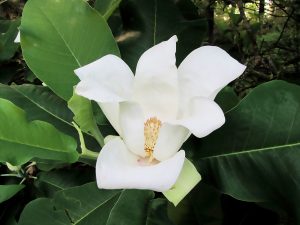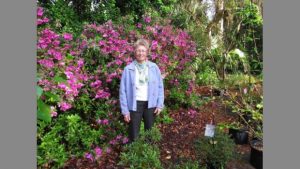Florida native plants for sustainable landscapes.
Visit PlantRealFlorida.org

Ashe Magnolia blossom. Photo by Steven P. Christman.
Leslie Pierpont, former owner of Native & Uncommon Plants and a former FANN member who successfully transitioned her business to the next generation, Alfred and Leslie Romeu, has successfully lobbied to have our beautiful native Ashe Magnolia named 2017 Plant of the Year by the Garden Club of America (GCA). Annually since 1995, the GCA has identified a stellar North American native plant to receive the Montine McDaniel Freeman Medal for Plant of the Year. Leslie prepared the Ashe Magnolia nomination as a member of the “Late Bloomers Garden Club, Zone VIII and will be traveling to Baltimore in May to accept the GCA Freeman Medal on behalf of her club.
“Long-lived, tolerant of heat and resistant to diseases, deer and insects, this magnolia is an ideal specimen tree for the small garden,” says Lucy Rhame of the GCA.
The Ashe Magnolia got 80,000 likes on the Garden Conservancy Facebook page, so y’all better get planting!
Magnolia ashei Ashe magnolia
(information provided by Garden Clubs of America)
Named after U.S. Forest Service forester, William Willard Ashe, Magnolia ashei, Ashe magnolia, is a spreading, deciduous, understory shrub or small tree endemic to 8 counties in Florida but capable of growing in Zones 6 to 9 in rich, moist, well drained, acidic soil. An outstanding specimen in a shady woodscape, the dark green glossy leaves can grow up to 2 feet long. Large citrus scented, creamy white, saucer shaped flowers with purple stains at the base of the 6 to 9 pedals are characteristic of this plant. The flowers can reach up to 12 inches across during blossom in early spring. The flowers set fruit borne in cone shaped aggregates that are an attractive pink-purple color adding fall interest to the plant. Seeds should be collected when the fruit turns bright red and stratified with a minimum of 60 days cold, moist storage to ensure germination.
The Florida Department of Agriculture lists the Ashe magnolia as endangered due to its small population and restricted area of growth in Florida though the tree can be grown in a wider geography. The flowers support pollinators and the fruit is eaten by wildlife. Long-lived, tolerant of heat and resistant to diseases, deer and insects, this magnolia is an ideal specimen tree in a small garden.
FANN growers listing wholesale supply of Ashe Magnolia:
https://www.floridanativenurseries.org/plants/detail/magnolia-macrophylla-var-ashei
Interesting comments about this plant in FANN mail:
from UF/IFAS North Florida Research and Education Center Professor Gary Knox
“Ashe magnolia is adaptable to USDA Cold Hardiness Zones 6 -9 (quite a big chunk of the country).
Ashe magnolia is only listed as endangered in Florida; it is not on the federal list of endangered plants. As I understand it, federal listing would affect production, sales and transport across state lines, though others may have more knowledge and a better understanding.
State listing as endangered is probably appropriate due to its restricted habitat (primarily ravines) and limited range (limited areas in only 9 counties and not all sites are protected). I am leading a team of researchers studying pollination, seed predation, seed dispersal, plant injury, and potential disease threats of Ashe magnolia in natural areas. We are studying Ashe magnolia in just two sites, and have found lots of trees but few seedlings. USDA National Arboretum scientists have been evaluating genetic diversity of Ashe magnolia across the nine counties, but I don’t know results.”
from Ashe magnolia grower Dave Chiappini, Chiappini Farm Native Nursery:
“Don’t think this plant will be coming off the state endangered list … because the area they grow in is rapidly disappearing. One reason he [Gary Knox, IFAS] sees no seedlings is because most of the seed are not viable. Funny that Mother Nature did this, the bottom part of the flower is male and ready in the morning, the upper part is the female and isn’t ready until late afternoon, so not much chance of the pollination to go ahead.” [Editor’s note: does this sound like a familiar problem, LOL.]
See additional info in newspaper article about research into Ashe Magnolia pollination.
from Vanessa Crisler, Trillium Gardens:
Superior Trees grows Ashe in large quantities!
Leslie Pierpont (photo stolen from a Jacksonville area newspaper)

The Freeman Medal was established to highlight underutilized, but highly worthy, native trees, shrubs, groundcovers, vines and perennials. “The goal is to draw attention to select native plants to encourage their use in the landscape and make them familiar to gardeners and more available in nurseries,” explains Rhame. Annual selection is made by a group of nationally renowned horticulturists and experts in the nursery trade. Woody and herbaceous plants are nominated in alternate years. The 2017 winners were selected from 18 plants nominated by members of GCA clubs.
The medal honors Montine McDaniel Freeman (1915-98), member of the New Orleans Town Gardeners Club, and was established by her son and daughter-in-law. Freeman was an outstanding horticulturist particularly enamored of native plants. Her 93-acre Beechwood Gardens boasted more than 4,000 azaleas, camellias and magnolias.
The GCA, founded in 1913, is composed of 200 clubs with nearly 18,000 members who devote energy and expertise to projects in horticulture, conservation and civic improvement across the United States.
Nice note from the GCA: “The GCA would appreciate your making your constituents aware of these underutilized, but highly worthy, native plants that help ensure successful gardening. Native trees, shrubs, groundcovers, vines, and perennials require less fertilizer, pesticide, water, and maintenance than non-native alternatives. Birds and wildlife benefit from the berries and seeds.”
Way to go, Garden Club of America and our own dear Leslie Pierpont!